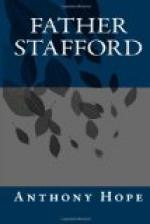Sir Roderick Ayre, however, was not restrained by Eugene’s scruples nor inspired by Eugene’s devotion to Stafford. Stafford interested him, but he was not his friend, and Ayre did not understand, or, if truth be told, appreciate the almost reverential attitude which Eugene, usually so very devoid of reverence, adopted toward him. Ayre thought Stafford’s vow nonsense, and that if he was in love with Claudia Territon there was no harm done.
“Many people have been,” he said, “and many will be, before the little witch grows old and—no, by Jove! she’ll never grow ugly!”
Trivial as the matter seemed, looked at in this light, it had yet enough of human interest about it to decide him to leave the grouse alone, and wait patiently for the partridges at Millstead. After all, he had shot grouse and most other things for thirty years; and, as he said, “The parson was a change, and the house deuced comfortable, and old Eugene a good fellow.”
Now it came to pass one day that the devil, having a spare hour on his hands, and remembering that he had often met with a hospitable reception from Sir Roderick, to say nothing of having a bowing acquaintance with Morewood, looked in at the Manor, and finding his old quarters at Sir Roderick’s swept and garnished, incontinently took up his abode there, and proceeded to look round for some suitable occupation. When this momentous but invisible event accomplished itself, Sir Roderick was outwardly engaged in the innocent and aimless pursuit of knocking the billiard balls about and listening absently to a discourse from Morewood on the essential truths which he (Morewood) had grasped and presented alone of modern artists. The theme was not exhilarating, and Sir Roderick’s tenant soon grew very tired of it; the presentment of truth, indeed, essential or otherwise, not being a matter that concerned him. But in the course of an inspection of Sir Roderick’s consciousness, he had come across something that appeared worth following up, and toward it he proceeded to direct his entertainer’s conversation.




